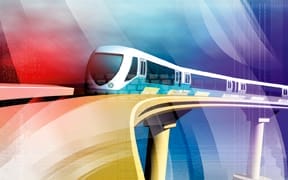Commuter train boosters pull a fast one on the public.
By Deb Jordahl
Never give up; three simple words that have become the battle cry of commuter rail enthusiasts here in southeastern Wisconsin. And while there’s nothing simple about constructing, maintaining and operating commuter rail, its child’s play compared to selling a weary public on the virtues of building a new system on our dime and in our backyard.
Pro-rail forces have been trying for decades to convince us that we need commuter rail. Their plan has undergone more cosmetic surgery than Joan Rivers. The latest makeover calls for a 33-mile system running from Milwaukee through Racine to Kenosha and connecting with the Illinois METRA system to downtown Chicago. The planners dream of 14 workday roundtrips and start-up costs—pick a number!—of supposedly $198 million. Frustrated but never defeated, our community leaders know that the general public simply cannot be trusted to make the right decision when it comes to this investment in mass betterment.
But what are elitists to do when public opinion gets in the way? Why, get an unelected board to bypass them, of course.
Enter the regional transit authorities the Democrats slipped into the state budget. These unelected boards will be empowered to raise taxes, issue debt and even seize private property. At the same time, RTA members have been completely insulated from an angry electorate. You can’t throw these bums out, because you didn’t hire them!Proponents say Regional Transit Authorities (RTAs) give local governments a mechanism for replacing declining federal and state aid without increasing property taxes. What’s more, they say, RTAs allow regions to invest in long-term improvements to the transportation infrastructure.
Translation: RTAs let government keep right on spending money it doesn’t have on projects the public would likely reject if given the opportunity. Truth be told, the public would most likely oppose creating the RTA in the first place.
This is precisely why proponents have gone to such great lengths to avoid an open and honest debate on the subject; why Doyle stuck the plan in his 1,700-page budget, rather than presenting it in separate legislation; and why the Legislature’s Joint Finance Committee voted to pass it at 3 a.m.
What a great way to avoid the questions our neighbors in southeast Wisconsin have been asking, like: Will traffic really be stopped 1,500 times a day to allow trains to pass, including once every 15 minutes during rush hour?
Will it really cost taxpayers $25 per rider for every round trip? Will that obnoxious train horn blow at each of the 53 crossings 28 times a day? The absurdity of abdicating taxing and spending authority to a completely unaccountable board should be obvious to policymakers. (For an object lesson in what can go wrong, look at the Milwaukee Area Technical College’s shenanigans.)
However, since the acquisition and maintenance of power remain the primary purpose of elected leaders who want to have their train and ride it too, expect to see a proliferation of these unelected boards throughout Wisconsin.
Deb Jordahl is a conservative strategist and consultant.





